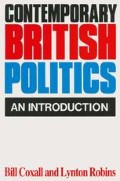Abstract
In seeking an understanding of the nature of politics we begin by considering those features of human society out of which the need for politics arises. We then move on to examine whether, as some people allege, certain spheres of human life are inherently non-political. In this section, we ask and seek to answer the question ‘What makes a disagreement political?’ The chapter ends by analysing the role of violence in politics. Is politics a particular non-violent way of resolving disagreements or does it comprehend all methods including force?
Preview
Unable to display preview. Download preview PDF.
Further Reading
Crick, B. (1982) In Defence of Politics, Harmondsworth, Penguin, 2nd edn (expanded).
Duverger, M. (1966) The Idea of Politics, London, Methuen.
Lucas, J. R. (1966) The Principles of Politics, Oxford, University Press (paperback edn, 1985).
O’Sullivan, N. (ed.) (1983) Revolutionary Theory and Political Reality, Brighton, Wheatsheaf.
Renwick, A. and Swinburn, I. (1987) Basic Political Concepts, London, Hutchinson, 2nd (updated and expanded) edn.
Wilkinson, P. (1977) Terrorism and the Liberal State, London, Macmillan.
Editor information
Copyright information
© 1992 Bill Coxall and Lynton Robins
About this chapter
Cite this chapter
Coxall, B. (1992). What is Politics?. In: Robins, L. (eds) Contemporary British Politics. Palgrave, London. https://doi.org/10.1007/978-1-349-19867-2_1
Download citation
DOI: https://doi.org/10.1007/978-1-349-19867-2_1
Publisher Name: Palgrave, London
Print ISBN: 978-0-333-34046-2
Online ISBN: 978-1-349-19867-2
eBook Packages: Palgrave Political & Intern. Studies CollectionPolitical Science and International Studies (R0)

